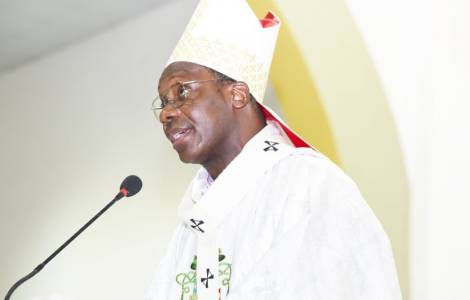
Cotonou (Agenzia Fides) - "The increasing spread of armed groups that are causing fear and terror throughout the Sahel region is a consequence of the catastrophic security situation in Libya. And the label 'jihadists' should not be applied to these gangs, as often happens in the West, especially in order not to confuse these groups with Muslims, who are also victims of their violence and abuse", said the President of the Bishops' Conference of Benin and Archbishop of Cotonou, Roger Houngbédji, to Fides, describing with realism the emergency and the difficult situation that the Church and the people of Benin are facing today.
What is the situation of the church in Benin?
The Catholic Church in Benin is growing and in turmoil. The number of baptized people is increasing and lay people are involved in various associations, movements and prayer groups. In my diocese, for example, there are numerous lay associations that are involved in pastoral care, in parishes and in the context of social initiatives or in church institutions such as health centers, schools and reception centers.
In Benin, 35 people recently tragically died in the explosion of an illegal fuel depot (see Fides, 25/9/2023). What can you tell us about that?
This is not the first time such an accident has occurred; several have happened with the loss of human lives. Those involved in fuel smuggling between Nigeria and Benin store the fuel at their homes, putting themselves, their families and their neighbors in dangerous situations. Even illegal outlets that sell the smuggled fuel do not take precautionary measures, so such accidents can occur on a daily basis, with all the victims and consequent material damage.
The government has passed a law to prevent fuel smuggling and is trying to curb illegal roadside outlets while increasing the number of regular gas stations. However, these efforts are still insufficient. The basic problem is still poverty in which a large part of the population lives: since they do not have a permanent job, many people turn to illegal activities like this, forgetting all the risks involved. So jobs have to be created to avoid such tragedies.
Is Benin also affected by the phenomenon of migration due to poverty?
Our young people emigrate primarily to the neighboring countries of Nigeria and Côte d'Ivoire in search of work. There are not many Benineses on the migration routes in the desert and then in the Mediterranean, but our young people are constantly looking for work. This is the biggest challenge for our country. As long as those in power do not work to improve the living conditions of our young people, we will continue to be confronted with dramas like these days.
Another problem the country is facing is the incursion of jihadist groups from the north.
There are a large number of terrorist groups throughout the Sahel. I would not speak of jihadists, that is a term that is not accepted by Muslims because they themselves are waging a fight against these terrorists who also threaten them. Armed groups have multiplied across the Sahel, particularly after Libya became a security disaster, opening the door to these terrorists. There have been a number of attacks in northern Benin that have resulted in casualties among our soldiers. The government has assured us that it has security measures in place to prevent terrorists from entering our country and causing damage as they did in Mali, Burkina Faso or Niger. And that is a major concern among the population.
Can ecumenical and interreligious dialogue be an instrument of peace?
In Benin, thank God, we live together in peace between religious denominations. In general, there are good relations between Christians, Muslims and followers of traditional religions. During popular uprisings related to political events, religious leaders come together to design a communication strategy that calls for peace with one voice and promotes unity and cohesion. A solidarity that also exists among us religious leaders and that enables us to search together for paths to justice and peace, especially when we are experiencing social and political crises. (L.M.) (Agenzia Fides, 28/10/2023)